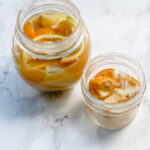Preserved Meyer Lemons
Preserved Meyer Lemons add exquisite flavor to so many dishes. The long and slow fermentation gives the lemons a vibrant saltiness and brings bright citrus and complex tartness to your cooking. All you need is lemons, salt and some patience, and soon you will have something incredible to enjoy all year long.
Servings: 1 pint mason jar
Calories: 38kcal
Ingredients
- 6 Meyer lemons organic is best, if you can find them
- 1/4 cup kosher salt and more to top of jars
- 2/3 cups Meyer lemon juice or conventional lemon juice
- extra-virgin olive oil to add to top of jars before storing in fridge (a mild olive oil, avocado oil or grape seed oil will also do fine)
Instructions
- Cover the bottom of a bowl or casserole with some of the kosher salt.
- Thoroughly clean lemons and trim off the nubs both ends.
- Slice them in half, then into quarters, then eighths. As you cut them remove the seeds-Meyer lemons have many seeds.
- Toss the lemon wedges very well in the kosher salt.
- Pack the salted lemons into the jar.
- Use the handle of a cooking spoon (or a pestle) to press down on the lemons to allow them to release their juices and pack tightly into the jar.
- Continue packing in lemons, until you have no more room to add more wedges.
- Press down until the juice from the lemons covers the majority of the lemons. Use the spoon handle to push them together and really pack them closely together.
- If there isn't enough juice after pressing, add the additional lemon juice.
- Sprinkle on some more salt (about a tablespoon) over the top of the lemons before sealing the jar (I made two small jars).
- The mixture of salt and lemon juice will preserve the lemons. The salted lemons will give off a little more juice as they begin to cure.
- Leave an inch below top of jar and seal it.
- Leave them in a cool and dark place and gently shake them a couple times a day for four days. Add some oil (I used extra-virgin olive oil, but you could use any light oil, like avocado oil or grape seed oil) on top of the lemons, seal the jars and then store them in the fridge. It is normal that you will notice that the salt will make the liquid thicken and turn a bit cloudy. Give them a shake every week (I was still shaking mine every day).
- After a month, your preserved lemons will be ready to use.
Notes
You can add bay leaves, cinnamon sticks, clove, chiles, or even pink or black peppercorns.
I added extra-virgin olive oil on top of the lemon juice. Just to make sure it was truly completely covered.
Once preserved (after 1-3 months in the fridge), they still stay good in the fridge for up to 1 year.
Be sure to completely cover the lemon wedges with enough lemon juice and or extra-virgin olive oil. If the lemon wedges are not fully covered by the liquid, or your equipment wasn't sterile, the preserved lemons can develop mold. You could even use conventional lemon juice (not the bottled)to cover the lemons (they have more acidity than Meyer lemons).
Use your common sense when evaluating whether to eat preserved or fermented foods.
To use, remove however much preserved lemon your recipe calls for from the jar and rinse it off before chopping it finely and adding it to your recipe.
I added extra-virgin olive oil on top of the lemon juice. Just to make sure it was truly completely covered.
Once preserved (after 1-3 months in the fridge), they still stay good in the fridge for up to 1 year.
Be sure to completely cover the lemon wedges with enough lemon juice and or extra-virgin olive oil. If the lemon wedges are not fully covered by the liquid, or your equipment wasn't sterile, the preserved lemons can develop mold. You could even use conventional lemon juice (not the bottled)to cover the lemons (they have more acidity than Meyer lemons).
Use your common sense when evaluating whether to eat preserved or fermented foods.
To use, remove however much preserved lemon your recipe calls for from the jar and rinse it off before chopping it finely and adding it to your recipe.
Nutrition
Calories: 38kcal | Carbohydrates: 12g | Protein: 1g | Fat: 0.4g | Saturated Fat: 0.1g | Polyunsaturated Fat: 0.04g | Monounsaturated Fat: 0.01g | Sodium: 28295mg | Potassium: 182mg | Fiber: 1g | Sugar: 4g | Vitamin A: 11IU | Vitamin C: 66mg | Calcium: 29mg | Iron: 0.4mg
